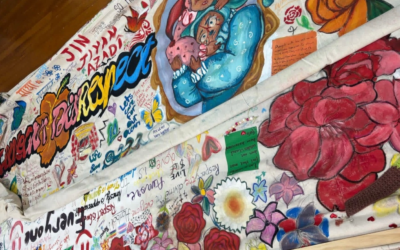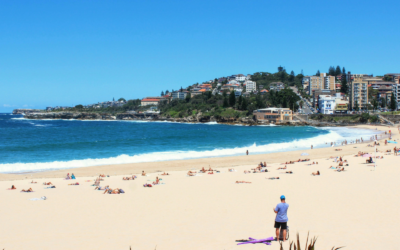Author: Tenesha Kumar (Edited by Eugenia Kourkoutas)
Foreword by W’SUP Editorial Team:
The W’SUP team has always been dedicated to recognising the voices, ideas and experiences of the Western student population and the Western community overall. In continuing to honour these important experiences, we’d like to showcase the voice of Tenesha Kumar. She’s a current journalism student at Western who has expressed her powerful outcry and thoughts on the arrests of two Western students on Wednesday 9th of October at a Pro-Palestine Rally on Parramatta South.
Kumar’s words highlight the overwhelming confusion, pain and anguish felt by people within Western’s student cohort and how the importance of safety and peace needs to be at the forefront of our students’ protests. Kumar also discusses the necessity of Western students’ rights to peacefully express their thoughts and feelings in viewing the horrific events of war and conflict that has continued in Gaza and Lebanon throughout history and the modern world
The W’SUP Editorial Team thanks Kumar for her submission. Her voice, as well as the voices of others during this difficult time, deserve to be heard, respected and appreciated: these are her words on the matter.
Scenes from the Palestine Rally at Western’s Parramatta South Campus. Photo Taken by Julia Bell. 9th of October 2024
From Tenesha Kumar:
As a student at Western Sydney University, I am appalled to see a demonstration of students’ freedom of voice escalate into what I see as an act of institutional brutality where two young students were forcefully taken, dragged and arrested at the hands of the NSW Police Force and then later allegedly suspended by Western Sydney University’s administration.
On the 9th of October, students partook in a planned demonstration on the Parramatta South campus, as part of the continuing Free Palestine movement headed by WSU4Palestine. Approximately 30 students and tutors participated in a sit-in near the entrance of E.B Block. In the demonstration I bore witness to, students in WSU4Palestine appeared to present themselves unarmed and peaceful.
Students urged the University to divest from alleged ties to Israel, including Western’s affiliations to weapons manufacturers, such as Thales, BAE Systems and RTX also known as Raytheon. WSU4Palestine members are concerned that these connections could indicate that the university is complicit in arming Israel in the alleged genocide of Gaza and Lebanon, as stated on WSU4Palestine social media sites. However, this protest led to the arrests of 3 Western students accompanied by what I would deem as unnecessary aggression with the young men being pushed and dragged by their legs and arms out of the E.B block by NSW Police.
The notion of on-campus student activism regarding socio-political issues is not a new phenomenon. Student-led protests have existed for LGBTQI+ rights, women’s rights, anti-racism and now for the Free Palestine Movement. Under human rights standards, it is fundamental that universities protect, respect and facilitate students’ right to protest. Western has a duty of care for students on campus.
After speaking to students who witnessed the events and state of the campus on the 9th of October, students appeared to fear the overwhelming presence of NSW Police – who were both uniformed and non-uniformed as on campus security and Operations Support Group police officers trained in public riot response.
Just 6 days before the rally on October 9th, George Williams, the newly appointed Vice-Chancellor, sent a mass email titled, ‘Your wellbeing is important- we care about you’. Williams’ email continued:’ Students are the heart of everything we do at Western Sydney University’. He also stated in his email that, “Our capacity is to care for each other. Our promotion of respect and trust are defining characteristics of this University”.
Questions raised about the treatment of students during the protest:
Summarising the student body’s general concerns prompts the following questions: ‘was the wellbeing of our peers valued while they were being carried out of buildings and pushed against the wall at the hands of the NSW Police?’ ‘Were the characteristics of respect and trust facilitated when students felt intimidated and were seemingly brutalised on campus grounds?’ ‘Was the wellbeing of our peers valued when following these events?’
As the Free Palestine movement has continued, I believe there has been an increased police presence and hostility from the University on days WSU4Palestine hold any form of action– with increased security that I have not witnessed during other events hosted by Western student clubs.
When asked about whether the NSW Police were called by the university, Kevin Dunn, within an Instagram post made by WSU4Palestine, stated:
“The police attended at their own decision making. We did not invite them; they were made aware through social media posts that I think came from the people organising the protest.”
Scenes of anger and intimidation directed at Western students deeply affected our cohort members who witnessed them. One WSU4Palestine student at the rally, shown within a WSU4Palestine social media post, expresses the confusion and hurt felt by herself and the students in witnessing these events firsthand:
“As students we are all shocked…the University is not standing up with us and they are not even acknowledging what we are feeling…Kevin Dunn he just came here and we just told him ‘what are you going to do to protect your students, what are you going to provide your students at Western Sydney University?!’ All he could say was that “he is going to provide counselling services.”
The two male Western students of alleged Black and Arab descent, who were arrested, were later charged with assault and resisting arrest. WSU4Palestine students alleged the two arrested students had been targeted by officers, who continued to respond in a manner that even the WSU SRC deemed “excessive and disproportionate”.
Lessons Learned and the Future of Western Protests:
Following the events of October 9, the SRC and Vice Chancellor met to discuss the concerns about students’ right to protest safely on campus. The meeting concluded with VC Williams agreeing to a “full review of the incident to ensure future protests are managed properly”, shared in the SRC Open Letter Statement.
I learned three valuable lessons on campus on the day of October 9. In my view:
- My university will not consider my safety or the safety of my peers as they welcome physical force as a response to student protests for civil justice.
- Western does not stand in solidarity with students or effectively and peacefully intervene in any movement that is deemed to have escalated.
- Western will go to great lengths to silence the student voice, and social activism, as seen in the outcome of the rally.
In my view, the University has made no effort to condemn the actions of the NSW Police, or at the very least take accountability for their involvement in the escalation of matters.
To me, having observed the University’s reluctancy to protect students, I can only assume the agency of student voice within the University does not exist and will never exist if we continue proceedings, akin to that of brutality and anger, to occur under the false guise of protection, care, and safety. Consequently, creating a space where a peaceful student-led sit in can become a day of pain and distress for students.
In this closing statement, I ask all students at Western Sydney University to let October 9th be a reminder of our power and voice as a student body while our university remains complicit and silent in the conflict in Gaza. Let this event not become a setback, but a catalyst to unite us as one and drive us to pursue more ways of facilitating our freedom of speech, and true demonstrations and representations of care, peace, humanity, and justice, within Western Sydney University and beyond.




